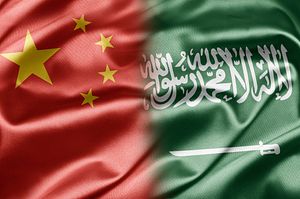Saudi Arabia’s Defense Minister and Crown Prince, Salman Bin Abdulaziz Al Saud, is in Beijing from March 13 to 16 for meetings with Chinese leaders. On Thursday, he was given a warm welcome by Chinese President Xi Jinping, who called Saudi Arabia “China’s good friend, brother and partner in the Middle East and Gulf region.” According to Xinhua, Xi and Salman pledged “to strengthen [the] strategic partnership” between China and Saudi Arabia.
China and Saudi Arabia formed diplomatic relations rather late, in 1990. However, since then ties have expanded rapidly as China’s reliance on foreign oil has grown. In the fall of 2013, China officially overtook the United States as the largest net importer of oil. In particular, China is expected to soon pass the U.S. as the largest importer of oil from OPEC, resulting in more reliance on the OPEC nations—including Saudi Arabia. As of 2013, Saudi Arabia was China’s largest supplier of crude oil, although China has also recently been trying to diversify its oil suppliers.
But while energy cooperation remains a bulwark of China-Saudi Arabia relations, it’s clear that both countries are seeking to expand their ties. Xi Jinping told Salman, “Both sides should take energy cooperation as a pillar and expand partnership in aerospace and new energy to forge closer ties.” He also invited Saudi Arabia to join the Silk Road Economic Belt and the Maritime Silk Road, China’s two ambitious, westward-looking economic initiatives that seek to link Xinjiang province to the Gulf states via Central Asia.
Xi also promised to back Saudi Arabia in another way, by “expressing China’s support to Saudi Arabia for choosing a development path that suits its own conditions.” Saudi Arabia’s historic ties with the United States have frayed somewhat in recent years, partially due to the U.S. response to the Arab Spring. As a monarchy, Saudi Arabia’s government remains opposed to such populist movements and was disquieted by the U.S. asking longtime ally, Egyptian president Hosni Mubarak, to step aside. Saudi Arabia has banned protests within its borders and even been accused of using deadly force against demonstrators. Riyadh has also sent troops to neighboring Bahrain to help quell demonstrations there, to the dismay of U.S. officials. Xi Jinping’s comments offer a veiled reference to the fact that China would never criticize Riyadh for such actions.
For his part, Salman said that “Saudi Arabia is ready to enhance cooperation with China to protect peace, security and stability in the region.” According to a statement from the Saudi Press Agency, Salman in particular asked for China to play a role in helping “the Palestinian cause” and in cooperating to reach a solution to the Syria crisis. “We look forward to China as an international magnate with a great political and economic weight to play a prominent role in achieving peace and security in the region,” Salman said.
Increased China-Saudi Arabia cooperation makes sense for both Beijing and Riyadh. As China’s dependence on foreign oil grows, Beijing will need to ensure good relations with the powerful oil countries in the Middle East—and Saudi Arabia is the most important of those. Further, a good relationship with Saudi Arabia would allow China not just to secure oil imports from Riyadh, but to create a partnership dedicated to “stabilizing” the region, ideally keeping all Middle Eastern oil flowing smoothly.
Meanwhile, Riyadh has been making numerous outreaches to its east, including signing defense cooperation agreements this year with both India and Indonesia. There have even been reports that Saudi Arabia is interested in purchasing Pakistani-Chinese produced fighter jets, which would represent a large step away from reliance on the U.S. and the West for defense technology. Saudi Arabia’s “pivot east,” so to speak, helps Riyadh balance out its foreign policy, avoiding an overreliance on U.S. support. When it comes to China in particular, Saudi Arabia has found a major power that (unlike the U.S.) will not criticize Saudi Arabia’s human rights records and doesn’t have close ties to Israel. That in and of itself makes a compelling case for Riyadh to seeks closer relations with Beijing.

































